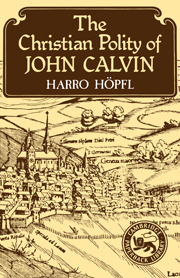Book contents
- Frontmatter
- Contents
- Preface
- Note on sources, orthography, notes and translations
- Introduction
- 1 The training of a lawgiver
- 2 The Institution: the first version
- 3 The first public ministry
- 4 Reconstruction
- 5 The Institution of 1543
- 6 Geneva and Calvin, 1541–64
- 7 The civil order of a Christian commonwealth
- 8 Political morality in the thought of Calvin
- 9 The laws and mores of a Christian commonwealth
- 10 Unfinished business: a speculative summary and postscript
- Appendix I Calvin's conversion
- Appendix II Predestination
- Notes
- Bibliography
- Index
- Cambridge Studies in the History and Theory of Politics
- Frontmatter
- Contents
- Preface
- Note on sources, orthography, notes and translations
- Introduction
- 1 The training of a lawgiver
- 2 The Institution: the first version
- 3 The first public ministry
- 4 Reconstruction
- 5 The Institution of 1543
- 6 Geneva and Calvin, 1541–64
- 7 The civil order of a Christian commonwealth
- 8 Political morality in the thought of Calvin
- 9 The laws and mores of a Christian commonwealth
- 10 Unfinished business: a speculative summary and postscript
- Appendix I Calvin's conversion
- Appendix II Predestination
- Notes
- Bibliography
- Index
- Cambridge Studies in the History and Theory of Politics
Summary
All four syndics elected in February 1538 were hostile to Farel and Calvin. The final confrontation came before Easter; the immediate issues were the magistrates' demand that all be admitted to communion who would present themselves and the adoption of the Bernese rite, which was somewhat less aggressively anti-Roman and anti-traditional than what Calvin had in mind. Although Wendel is right to say that the Bernese rite per se was not an essential of faith for Calvin, the fact that its adoption was being pressed by the magistrates made it something to be resisted. Nor had excommunication been identified by Calvin as one of the marks of a true church, even though there is no mistaking the importance which he had come to attach to it. In any case, both parties understood clearly that what was at issue was who should be master in what the ministers, but not the magistrates, regarded as their own house. The last straw, the prohibition of preaching (which followed attacks by the ministers on the new officials, delivered from the pulpit), was an attack on one of the marks of a true church. It was followed rapidly by the ministers' refusal to administer communion, their ignoring of the order to refrain from preaching, and the summary dismissal of Calvin, Farel and Courrault, an intransigent and blind old minister.
It appears that the ministers were shaken by their expulsion and at first did not regard it as final.
- Type
- Chapter
- Information
- The Christian Polity of John Calvin , pp. 77 - 102Publisher: Cambridge University PressPrint publication year: 1982

